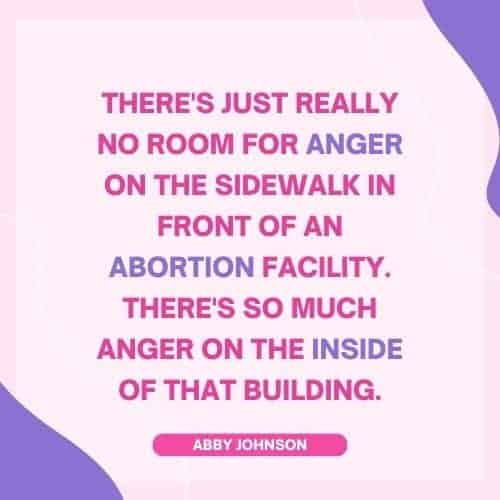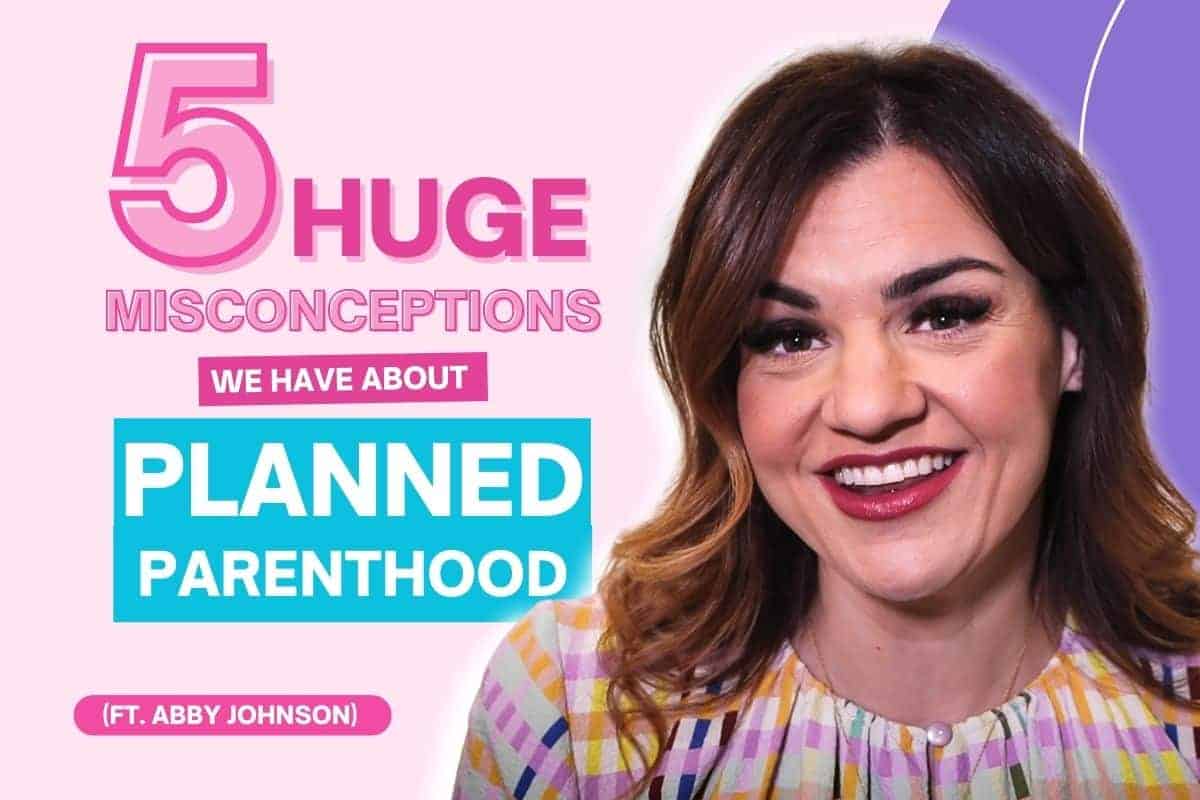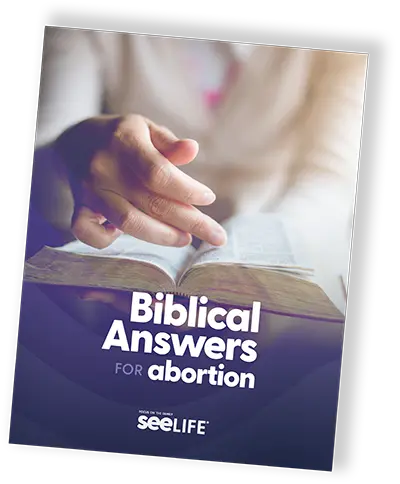In October 2009, after witnessing an abortion on ultrasound, Abby Johnson resigned as director of a Planned Parenthood abortion clinic. Fueled by her haunting experiences with abortion and the abortion industry, Abby went on to write a book exposing the inhumanity of Planned Parenthood’s services.
Despite the work of Abby, and many other former pro-choicers who’ve denounced the abortion trade, Planned Parenthood remains a titan of the industry, aided by government funds and celebrated by those who claim to be pro-choice.
We sat down with Abby Johnson and asked her what some of the greatest myths that people tended to still believe about Planned Parenthood were.
Myth #1: Abortion is Safe and Clean
“People believe that abortion is this clean, sterile bloodless procedure, which is far from the truth.” Says Abby Johnson, “Abortion clinics are filthy; they are dirty. They can’t pass their inspections. They’re not run like other healthcare facilities, and abortion is incredibly bloody.”
Even if we set aside the intention of abortion (to end a life), there’s plenty of evidence to suggest abortion clinics and their practices are both messy and inhumane. Over the past few decades, several undercover investigations have produced shocking proof of Planned Parenthood’s cruel practices.
Investigating Planned Parenthood
- Lila Rose — Live Action founder and UCLA student, Lila Rose, went undercover as an abortion-minded 15-year-old. The investigation catapulted her into fame as she exposed how Planned Parenthood deals with cases of sexual abuse and trafficking.
- David Daleiden — A series of undercover videos from investigative journalist David Daleiden exposed several inhumane practices within the abortion industry. His investigative footage revealed everything from the trafficking of baby body parts to Planned Parenthood “dealing” with babies born alive.
Physicians Agree
Undercover journalists aren’t the only professionals speaking out against abortion practices. The American Association of Pro-Life Obstetricians and Gynecologists has thousands of members and associates. According to the AAPLOG, elective abortion endangers the health of their patients, both mother and preborn child.
"We are extremely concerned about the potential long-term adverse consequences of abortion on a woman's future health. We realize that, in the United States, reporting of both abortions and associated complications is generally not adequate to provide meaningful conclusions. We continue to explore data from around the world regarding abortion-associated complications (such as depression, substance abuse, suicide, other pregnancy-associated mortality, subsequent preterm birth, placenta previa, and breast cancer) in order to provide a realistic appreciation of abortion-related health risks."
The American Association of Pro-Life Obstetricians and Gynecologists
You can find more in-depth healthcare discussions from the AAPLOG here.
Myth #2: The Abortion Industry is Pro-Choice
“Your choice will be taken away whenever you walk into an abortion facility.” Abby Johnson says. “Abortion facilities are about making a profit. They’re about turning every client visit into a revenue-generating visit. And the only way they can do that for a pregnant patient is to sell her an abortion.”
Peek at Planned Parenthood’s social media. Their messages are typical “We’re all about self-empowerment” type messages. But are they really about empowerment?

Girls just wanna have equal pay.
Your weight should not impact your access to quality healthcare.
When black women thrive, we all thrive.
The page even hosts an inspirational quote from MLK, who would have undoubtedly reviled the abortion industry for how many black lives it’s claimed.
Other abortion providers share these same sentiments. And this makes perfect sense. The pro-choice position on abortion is supposed to be motivated by the love of freedom and the reverence of bodily autonomy. Hence the term pro-choice.
Despite all the pomp and circumstance, the stories of women with tragic and horrifying in-clinic experiences are ever-growing. One needn’t look far to find these stories. After all, these stories come from abortion clinic patients and workers alike. Here are a few examples:
Anti-Choice Abortion Stories
Eva
Eva Rubalcava, a former abortion worker, witnessed the concealing of important procedure details to patients while employed with Planned Parenthood.
Andrea
Andrea had hesitations about taking the first abortion pill. When she voiced her regret, the clinic told her she had to continue the pill regimen and carry out the abortion, despite there being abortion pill reversal which has saved thousands of babies (including Andrea’s) from the abortion pill.
Cynthia
Cynthia Wenz conceived in statutory rape and was taken for an abortion by her mother. Years later, she would discover her journal from that time, which records how she wanted the baby. She would not have chosen the abortion had it not been orchestrated by her well-meaning mother and the industry.
Catherine
Catherine recounts how her abortion clinic refused to show her the ultrasound of her child before conducting the abortion. The clinic claimed it was against their policy.
Can an establishment claim they are pro-choice when numerous patients and workers are denied essential information about the service they supply or secure? Is it pro-choice to enable coercion based on our own opinion of what is “good” for them?
These stories are not rare occurrences. They serve as startling reminders that the abortion industry is merely pro-choice until a patient’s choice isn’t the one they prefer.
Myth #3: They're All About Women's Health
This myth is disproven by the strategies employed by abortion providers, specifically when it comes to promoting and distributing abortion pills.
Ectopic Pregnancy and Abortion
Research shows that “Ectopic pregnancy occurs at a rate of 19.7 cases per 1,000 pregnancies in North America and is a leading cause of maternal mortality in the first trimester.”
The abortion pill is now the most popular form of abortion for ending pregnancies in this trimester. Meanwhile, ectopic pregnancy is life-threatening, impacting nearly 20 per every 1,000 pregnant women. In Planned Parenthood’s 2021 service report, the organization served 2.16 million patients and conducted 236,407 telehealth appointments. We can safely assume that most of these online appointments were related to Planned Parenthood’s primary service — abortion.
Also, in 2021, due to the pandemic, the FDA lifted specific regulations for providing abortion pills. These regulations included preliminary ultrasound screenings that would detect the life-threatening, ectopic pregnancies that thousands of their telehealth patients were at risk of experiencing.
Two years after the pandemic, these regulations remain missing from the abortion pill distribution process. If abortion providers cared about women’s health, one would think the well-being of their patients would be front and center when providing abortions, and they would insist on an office visit. Insist on an ultrasound to detect an ectopic pregnancy. Where the abortion pill is concerned, this doesn’t seem to be the case.
Abortion Only
According to Abby Johnson, the idea that abortion clinics provide essential non-abortion services to their community is the biggest misconception of all.
Many people believe “the abortion facilities like Planned Parenthood are providing some sort of necessary service for their community. Like, they’re providing preventative healthcare. They’re providing healthcare that these women can’t get anywhere else, like birth control, pap smears, and STD testing. And that’s simply a lie. In fact, in the past ten years, they’ve provided fewer healthcare services other than abortion than at any point in time in history. They are not about providing healthcare. They are about providing abortion and abortion only.”
And there’s data to back up these claims.
Planned Parenthood’s annual report lists how many non-abortion services they offer yearly. At first glance, this report seems impressive, boasting services like adoption referrals, STD testing, ultrasounds, pap smears and more. However, a breakdown from Charlotte Lozier Institute helps reveal Planned Parenthood’s focus is on their primary money maker: abortion.
“In 2019-20, abortions made up 96.6% of Planned Parenthood’s pregnancy resolution services, while prenatal services, miscarriage care, and adoption referrals accounted for only 2.2% (8,775), 0.7% (2,793) and 0.5% (1,940), respectively.
For every adoption referral in 2019-20, Planned Parenthood performed 198 abortions. Over the past 10 annual reports, this ratio was approximately 126 abortions for every adoption referral.”
Myth #4: They Care About Communities and Families
The idea that a family or community could benefit from “Family Planning” via contraception and abortion is most commonly attributed to Planned Parenthood founder Margaret Sanger.
At first glance, the idea that a couple could plan their size and timing makes sense. After all, isn’t it better for a child to be brought into a world where they can have the best chance at life? Isn’t it better if a child never has to experience the hunger, neglect, or rejection that might come if born at the wrong time or into challenging circumstances?
The sentiment is genuine. However, the issue with family planning lies in Sanger’s inhumane approach to the topic. Her work pioneering the abortion industry planted toxic roots that remain visibly present throughout Planned Parenthood practices and abortion culture today.
Sanger’s “Means to an End” Approach
Sanger notoriously preached eugenics. She believed that eliminating the weakest of the human population would better society. Though now buried under mounds of “it’s your choice” rhetoric, her beliefs remain the core motive behind abortion seekers and providers.
Exchange one human life for one that is better, stronger or more beautiful.
There is no pro-choice argument that does not hinge on this idea.
Does that life have a disability? Why not show a little compassion? Remove their pain by removing them completely. Their families and communities will also benefit in the long run, won’t they? How much hassle and heartache will we save them from?
Will ending this life mean that your life will have a higher quality? Why not make the simple exchange? After all, the life at stake won’t even object. And that’s basically consent, right?
Removing the "Defectives"
Sadly, the weight and reality of their services still haven’t seemed to set in for abortion clinics and their supporters.
Take, for example, the view of a Rewire Newsgroup contributor concerning the issue of abortion regulation. In one article, the author rails against the regulations of one particular abortion clinic, saying, “If it were a dermatologist’s office, the Falls Church Healthcare Center wouldn’t need a facility license. Not only is it medically unnecessary, but the license is redundant, given that other medical bodies already oversee the abortion clinic’s equipment and staff.”
You read that correctly. This article equates taking human lives to skin care.
But abortion supporters treating human life like a cosmetic blemish is nothing new. The idea that abortion can rid the world of unsightly lives dates back to the early pioneers of abortion in the U.S. More specifically, it was Planned Parenthood’s founder, Margaret Sanger, who referred to children from minorities, those with disabilities, and those born in difficult circumstances as “unfit,” “delinquents,” and “defectives.”
Myth #5: They're Unaffected By Their Work
Mother Teresa said, “I alone cannot change the world, but I can cast a stone across the waters to create many ripples.”
No choice is made that does not create a ripple effect in our world. When it comes to abortion, we like to think that most of these ripples are small and secret, only felt by the woman who made the abortion decision. But no human life is insignificant enough that it only impacts one person when taken from the world. At least three people are involved in a clinical abortion procedure: the baby, the mother and the abortion worker.
Abby Johnson and the Quitters
After Abby Johnson quit Planned Parenthood, she recognized the need in the abortion worker community for support and a haven for healing from their experiences. From that realization, she found, AND THEN THERE WERE NONE. Members of this ministry refer to themselves as “Quitters.” From front desk workers and patient escorts to abortionists and nurses, every Quitter has a story of how being in the business of ending lives took its toll. You can find a collection of their stories here.
Amid their stories, we find a common theme. Workers tend to be more desensitized to the impact of their work than immune to it. According to Abby Johnson, it’s often the abortion worker’s heart for their community and their desperation for their loved ones that leads them to rationalize their work.
Busting this last myth creates the most significant challenge for not only abortion workers but Christians and pro-life advocates alike. Taking a stand against the abortion industry would be easier if our “enemy” were one person, a criminal, some smirking villain that we could pinpoint and prosecute. But neither the abortion worker nor the abortion-determined woman is the enemy of the pro-life movement.
Abortion alienates men and isolates women. And the abortion industry preys on the abortion worker and preborn child alike. So, how do we address the abortion issue in a way that counters and heals the many wounds abortion can cause?
How to Shut Down Your Local Abortion Clinic (Ft. Abby Johnson)
Since Abby’s departure from the abortion industry, she’s spent countless hours helping both abortion clinic workers and abortion clients find healing from their experiences. As both a post-abortive woman and a former abortion worker, she says the best way to reach those impacted by the industry is to apply truth and grace alongside love and charity.
“I believe that, overwhelmingly, women who start working in the abortion clinic do so because they want to help women. Also, the majority of them have had abortions themselves. So, they desire to help women go through what they have also been through…
“The abortion industry, when they start to recruit for staffing positions, they’re recruiting from that same population of people.” Abby Johnson continues, “They are recruiting women who are primarily single mothers desperately looking for a job… And so these are women that are just simply trying to provide for their families. Planned Parenthood and the abortion industry, they are predators. They’re predators for the women who walk in and have abortions. They are predators for the women who walk in and work at those abortion clinics… And so that’s something that we really need to understand. That’s the heart that we need to have. That’s the heart that we need to have when we’re reaching out to these abortion clinic workers…”
In closing, Abby Johnson says the key to ending abortion, closing abortion clinics and seeing workers and clients healed hinged on people understanding their true value in Christ.
“…the heart of winning this argument, period, is helping people understand their value in Christ. That’s how I think we win.”
















